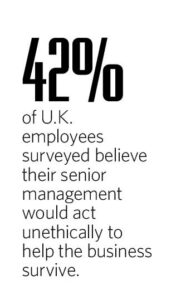The Ticker: Where Are the Whistleblowers?
U.K. companies have a corruption problem—or at least, a corruption perception problem. But employees do not seem to be willing to do much about it.
 According to EY’s Europe, Middle East, India and Africa Fraud Survey 2017, 25 percent of U.K. employees surveyed believe corruption to be widespread. On an individual level, 42 percent believe their senior management would act unethically to help the business survive. And while 37 percent of respondents are aware of a whistleblowing hotline within their company, 54 percent said they would not report such behavior due to concerns about career progression. One-third of respondents would refrain from reporting out of fear for their personal safety.
According to EY’s Europe, Middle East, India and Africa Fraud Survey 2017, 25 percent of U.K. employees surveyed believe corruption to be widespread. On an individual level, 42 percent believe their senior management would act unethically to help the business survive. And while 37 percent of respondents are aware of a whistleblowing hotline within their company, 54 percent said they would not report such behavior due to concerns about career progression. One-third of respondents would refrain from reporting out of fear for their personal safety.
The results point to deep cultural problems within U.K. organizations that will not be solved with policy changes alone. “Rules and regulation are only part of the solution,” says Jonathan Middup, partner, EY Fraud Investigation & Dispute Services, London. “It’s critical that the tone is set from the top, with senior managers leading by example. Training and awareness programs also have a role to play, helping employees to understand the consequences of fraud and corruption, but to be effective these should include discussion of gray areas and ethical dilemmas.”



